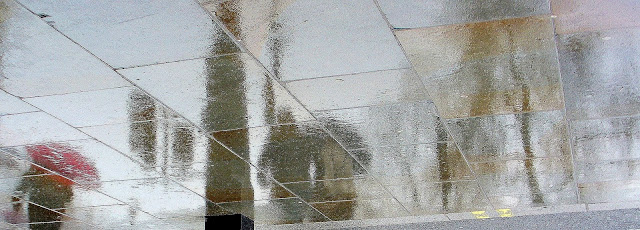Full-time work is defining. How could it not be, swallowing such a large part of time and energy? Defines me: tired, frustrated work machine. Nothing ticks inside a stopped mechanical, so ticking through the past few days was just the small, uncertain part that's not machine. Upside down, out-of-sorts days these have been, moving jerkily from inaction to action and back again. Tick. Hesitation. Tock. In the hesitation, things disappear: glasses, money... me. Finding my own rhythm would take so much longer than a week. The clocks went back last night. The mind treads water, while the body pushes forward and away [away until 9 April].
Upside down photo of Poise by Angela Conner at the Fitzwilliam.
























